I submitted this article to newsletter run by PC-Ukraine volunteers. It concerns the politics of language in Ukraine, a country where both Ukrainian and Russian are spoken although only the former is official. I should add that around the time I submitted this article I also sent an email some PC staff expressing some of the same concerns brought up here, and in response to this email the director of PC-Ukraine has since called me and put my mind at ease regarding the policies for deciding what language volunteers are trained in. I don’t want this to be construed as a criticism of Peace Corps policy—I am sure they share my concerns on the language issue and only have the best interests of Ukraine in mind.
The Importance of Speaking Ukrainian
Ben Hanes
TEFL XXIX, Velyka Lepetykha
In his epic poem “The Scythians” Russian poet Alexander Blok, addressing the nations of Europe, ponders the riddle of Russia:
Yes, Russia is a Sphinx. Exulting, grieving,
And sweating blood, she cannot sate
Her eyes that gaze and gaze and gaze
At you with stone-lipped love and hate. (1)
This schizophrenic attitude toward Europe—loving and hating it at once—tells of a deeper conflict in the Russian soul: the ambiguity of Russian identity. That is, does Russia belong to Europe or Asia? This lack of a concrete identity, this “in-between-ness,” is an important part of the Russian psyche that can be traced back centuries through Russian art. To this day Russia struggles with this dilemma.
To the extent that Ukraine shares history with Russia, it also shares in this ambiguous identity. The “geographic center” of Europe may be in Ukraine, but historical ties to Russia link Ukraine with Asia as well. During the Kievan Rus’ period (where Russian and Ukrainian history intersect), Genghiz Khan’s Mongol hordes conquered most of present-day Russia and Ukraine. Kievan Rus’ was the only major European power to be overtaken by the Asiatic hordes(2), an event that would bring the influence of Asian culture and Asian blood to the region and contribute to this confused identity.
While the Russians have the stability and economic might to keep one foot in Asia and the other in Europe and leave the question of their identity unanswered, Ukraine does not. Squeezed between the E.U. and the former U.S.S.R., Ukraine, as a developing nation, will fall under the sphere of influence of one of these giants; as Ukraine develops, it will need a senior partner in the process. Ukraine must decide where to look for this partner: East or West.
Westerners saw Yushchenko’s victory in the Orange Revolution as Ukraine’s choice of the latter over Russia. Nearly two years later, with Viktor Yanukovych serving as Prime Minister—a man with close ties to Moscow and whose 2004 presidential campaign was publicly supported by Putin himself—it seems this was an oversimplification. Ukrainians are very much conflicted about which direction their country should be heading.
The language struggle in Ukraine is symbolic of the struggle for the future of Ukraine. The central government is pushing for more Ukrainian (a rejection of the Soviet Union’s legacy, linguistically closer to Polish) yet a large contingent of the population clings to Russian (a remnant of Russian imperialism).
In deciding what language we speak, PCVs take part in this struggle. Of course in some regions, Crimea and the Lviv area for example, this struggle is not present. But throughout the majority of the communities in Ukraine, language is a contested issue. Although we are apolitical and should not pick sides in this struggle, Peace Corps has a responsibility to send Ukrainian speaking volunteers to these communities where the language question is contested.
I bring this up because of an alarming statistic brought to my attention by my regional manager. When asked in what language future volunteers sent to their sites should be trained, all of the Ukrainian-speaking volunteers in my region, save one, answered “Russian.” To those Ukrainian speakers in mixed communities who wish they spoke Russian, and to the staff in Kyiv considering sending Russian speakers to these sites, I urge you to consider the following.
The Supreme Rada declared Ukrainian the national language, but in many communities it is losing out to Russian. As guests of the Ukrainian government, we should not hinder its agenda. This is exactly what we do when we send Russian-speaking volunteers to mixed communities; we work against the government’s goal of implementing Ukrainian as the national language. We ought not treat our hosts like that.
The language that a PCV speaks, especially in small villages, affects the locals’ perception of that language. Many Ukrainians are embarrassed by their language, considering it an inferior “farmer’s language.” When Americans speak Ukrainian, it helps dispel this myth and helps Ukrainians feel proud of their mother tongue.
Many volunteers want to learn Russian because it is an international language that will be useful to them after Peace Corps. But we must remember we are here for the benefit of Ukraine first; our personal goals should take a back seat to what is best for Ukraine. Still, learning Ukrainian will make learning Russian in the future much easier (the alphabet and grammar are almost identical, cognates are abundant). If you learn Ukrainian well during your service, picking up Russian in the future will be a cinch. Think of it as linguistic cross-training.
Some will argue that in mixed communities most people speak Russian, making life for PCVs who learned Ukrainian unfairly difficult. While this may be true at some sites, remember: the grass is always greener on the other side of the linguistic barrier. Imagine how much you would struggle to understand the Ukrainian speakers if you knew only Russian. Besides, most people don’t speak pure Russian or Ukrainian, they speak surzhik. In communities like these, if you want to be able to understand everyone, you will have to have to know a bit of both languages. Fortunately once you get a few high-frequency words down, understanding conversational Russian is easy.
I am not saying that Ukrainians will be better off if they cast their lot with the Europeans—their cultural and historical ties to Russia run deep, and completely disregarding this relationship would be a mistake. But no matter what direction Ukraine looks to it must remain autonomous, and developing the Ukrainian language is key to developing Ukrainian autonomy. Peace Corps should remember this when making decisions regarding language.
1- Orlando Figes, Natasha’s dance: a cultural history of Russia. Picador, 2002. p. 419
2- Ibid., p. 366
Sunday, October 15, 2006
Monday, September 25, 2006
Teaching: 3 weeks in
Three weeks have passed since the start of the school year and I am optimistic, especially considering the disappointing fizzle that ended the last year. My first semester of teaching was rough: I found myself an underprepared teacher in an underfunded school with mostly uninterested students. The year couldn't end soon enough and I was completely burnt out by the time summer vacation began. But I've had a restful summer (touring Europe did a lot to take my mind off teaching), and some changes have been made at school that should help me have a more successful year.
First, we have trimmed the fat from some of my larger classes (not literally; my students are actually rather skinny). It makes my job easier when the kids in my classes are genuinely interested in learning English. I don't have to babysit as much. Right now I have one 7th, one 8th, two 9th, two 10th, and two 11th grade classes, and I will soon add one or two 6th grade sections. I have each class twice a week, except one of my 11th grade classes which meets three times. This is Masha's (host sister) class and it's one of my more fun classes. At this point I am teaching 17 hours a week, which is plenty.
 I've also become much more comfortable teaching. The training we received during the first three months in country was great, but going from zero to teacher in three months is just not realistic. I've had a chance to think about what I was doing right and what I was doing wrong last semester, and make some changes in my teaching style that seem to be paying off. My main problem was with classroom management. Namely I'm a softie, especially in contrast with the yelling-based tactics of their Ukrainian teachers. Once my kids learned this fact, class got a little nuts. But this year I laid out my rules on day one, learned some new choke-holds, and have been dishing out the pain. Also last year I was speaking a lot of Ukrainian when I saw the kids weren't understanding me, but this year I have an "English only" rule so the kids have to work for it, which is really the reason I'm here.
I've also become much more comfortable teaching. The training we received during the first three months in country was great, but going from zero to teacher in three months is just not realistic. I've had a chance to think about what I was doing right and what I was doing wrong last semester, and make some changes in my teaching style that seem to be paying off. My main problem was with classroom management. Namely I'm a softie, especially in contrast with the yelling-based tactics of their Ukrainian teachers. Once my kids learned this fact, class got a little nuts. But this year I laid out my rules on day one, learned some new choke-holds, and have been dishing out the pain. Also last year I was speaking a lot of Ukrainian when I saw the kids weren't understanding me, but this year I have an "English only" rule so the kids have to work for it, which is really the reason I'm here.
Most importantly, this year we will be trading our old deplorable Ukrainian textbooks for new books from a British firm. This is part of a grant I wrote with my coordinator for an English language resource center that will also include storybooks, reference books, films, etc. We should be getting the books sometime this week. I've basically just been buying time in class until then, not wanting to start in on the old texts, which has been an interesting exercise. The grant was painful to write but I was one of the only volunteers to have a grant accepted for our first eligible term, and now it's being passed around among our group as a model for those writing similar grants this term.
First, we have trimmed the fat from some of my larger classes (not literally; my students are actually rather skinny). It makes my job easier when the kids in my classes are genuinely interested in learning English. I don't have to babysit as much. Right now I have one 7th, one 8th, two 9th, two 10th, and two 11th grade classes, and I will soon add one or two 6th grade sections. I have each class twice a week, except one of my 11th grade classes which meets three times. This is Masha's (host sister) class and it's one of my more fun classes. At this point I am teaching 17 hours a week, which is plenty.
 I've also become much more comfortable teaching. The training we received during the first three months in country was great, but going from zero to teacher in three months is just not realistic. I've had a chance to think about what I was doing right and what I was doing wrong last semester, and make some changes in my teaching style that seem to be paying off. My main problem was with classroom management. Namely I'm a softie, especially in contrast with the yelling-based tactics of their Ukrainian teachers. Once my kids learned this fact, class got a little nuts. But this year I laid out my rules on day one, learned some new choke-holds, and have been dishing out the pain. Also last year I was speaking a lot of Ukrainian when I saw the kids weren't understanding me, but this year I have an "English only" rule so the kids have to work for it, which is really the reason I'm here.
I've also become much more comfortable teaching. The training we received during the first three months in country was great, but going from zero to teacher in three months is just not realistic. I've had a chance to think about what I was doing right and what I was doing wrong last semester, and make some changes in my teaching style that seem to be paying off. My main problem was with classroom management. Namely I'm a softie, especially in contrast with the yelling-based tactics of their Ukrainian teachers. Once my kids learned this fact, class got a little nuts. But this year I laid out my rules on day one, learned some new choke-holds, and have been dishing out the pain. Also last year I was speaking a lot of Ukrainian when I saw the kids weren't understanding me, but this year I have an "English only" rule so the kids have to work for it, which is really the reason I'm here.Most importantly, this year we will be trading our old deplorable Ukrainian textbooks for new books from a British firm. This is part of a grant I wrote with my coordinator for an English language resource center that will also include storybooks, reference books, films, etc. We should be getting the books sometime this week. I've basically just been buying time in class until then, not wanting to start in on the old texts, which has been an interesting exercise. The grant was painful to write but I was one of the only volunteers to have a grant accepted for our first eligible term, and now it's being passed around among our group as a model for those writing similar grants this term.
Sunday, September 24, 2006
My Digs
Here's a look at my apartment, which I moved into in April after four months at the Dyakov residence. It isn't much, but as far as volunteer apartments go I think I did pretty well.
 This is my kitchen. I try to spend as little time here as possible. If I'm in the kitchen, I'm probably not having a good time. The sink is small and clogs easily, making dishwashing a miserable exercise. There's a large electric water boiler (not pictured) in there which supplies me with hot water. Just plug it in, and in a mere two hours, voila! hot water! So I don't shower very regularly. Thankfully four years of college prepared me for this. I have four burners, two electric and two gas, but no oven. The village
This is my kitchen. I try to spend as little time here as possible. If I'm in the kitchen, I'm probably not having a good time. The sink is small and clogs easily, making dishwashing a miserable exercise. There's a large electric water boiler (not pictured) in there which supplies me with hot water. Just plug it in, and in a mere two hours, voila! hot water! So I don't shower very regularly. Thankfully four years of college prepared me for this. I have four burners, two electric and two gas, but no oven. The village has no centralized gas, so I get large tanks delivered to meet my cooking needs. Most families here heat with coal, but I am fortunate enough to have electric heating. It's noisy, but it works. The refrigerator is new and spacious. The crown jewel of my kitchen is my washing machine, the second best feature of my apartment. Washing machines are rare in Ukraine. Almost everyone has a dryer though--it's called "the porch."
has no centralized gas, so I get large tanks delivered to meet my cooking needs. Most families here heat with coal, but I am fortunate enough to have electric heating. It's noisy, but it works. The refrigerator is new and spacious. The crown jewel of my kitchen is my washing machine, the second best feature of my apartment. Washing machines are rare in Ukraine. Almost everyone has a dryer though--it's called "the porch."
 Most would call this room the "living room" but I prefer to call it "the lounge" since what I do in here, though technically "living," is best described as "loungin'." I try to lounge a good two hours every day, minimum. My preferred times for loungin' are immediately following school (3-4 p.m.) and after dinner (8-9 p.m.). The lounge doubles as a dining room when it's mealtime, and as a guestroom if I ever convince anyone to visit me. The lounge houses the best feature of my apartment: a big ol' flat screen television with a satellite hook-up. I get about twenty Russian and Ukrainian channels as well as CNN International, BBC World, and VH1 International--all in English. It's sweet and helps compensate for the fact that I live in the middle of nowhere.
Most would call this room the "living room" but I prefer to call it "the lounge" since what I do in here, though technically "living," is best described as "loungin'." I try to lounge a good two hours every day, minimum. My preferred times for loungin' are immediately following school (3-4 p.m.) and after dinner (8-9 p.m.). The lounge doubles as a dining room when it's mealtime, and as a guestroom if I ever convince anyone to visit me. The lounge houses the best feature of my apartment: a big ol' flat screen television with a satellite hook-up. I get about twenty Russian and Ukrainian channels as well as CNN International, BBC World, and VH1 International--all in English. It's sweet and helps compensate for the fact that I live in the middle of nowhere.

This is the bedroom/study. I sleep/work in here. It's a nice little room with a desk and bookcase. My bed isn't terribly comfortable, but it is long enough for me; staff from school made a makeshift extension by sewing a pillow to a box and putting it at the foot of my bed. I wish I was kidding, but no, I am a freak.
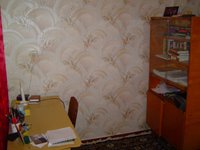
These are the dogs that live outside my building. I feed them scraps on occasion, they walk me part of the way to school. We have an understanding. Besides my students, these dogs are the only residents of Velyka Lepetykha with whom I speak English.

 This is my kitchen. I try to spend as little time here as possible. If I'm in the kitchen, I'm probably not having a good time. The sink is small and clogs easily, making dishwashing a miserable exercise. There's a large electric water boiler (not pictured) in there which supplies me with hot water. Just plug it in, and in a mere two hours, voila! hot water! So I don't shower very regularly. Thankfully four years of college prepared me for this. I have four burners, two electric and two gas, but no oven. The village
This is my kitchen. I try to spend as little time here as possible. If I'm in the kitchen, I'm probably not having a good time. The sink is small and clogs easily, making dishwashing a miserable exercise. There's a large electric water boiler (not pictured) in there which supplies me with hot water. Just plug it in, and in a mere two hours, voila! hot water! So I don't shower very regularly. Thankfully four years of college prepared me for this. I have four burners, two electric and two gas, but no oven. The village has no centralized gas, so I get large tanks delivered to meet my cooking needs. Most families here heat with coal, but I am fortunate enough to have electric heating. It's noisy, but it works. The refrigerator is new and spacious. The crown jewel of my kitchen is my washing machine, the second best feature of my apartment. Washing machines are rare in Ukraine. Almost everyone has a dryer though--it's called "the porch."
has no centralized gas, so I get large tanks delivered to meet my cooking needs. Most families here heat with coal, but I am fortunate enough to have electric heating. It's noisy, but it works. The refrigerator is new and spacious. The crown jewel of my kitchen is my washing machine, the second best feature of my apartment. Washing machines are rare in Ukraine. Almost everyone has a dryer though--it's called "the porch."Here's the shower. No matter how much I clean it, this room always looks like the scene of a murder. Really, showering doesn't happen often at chez Ben.

 Most would call this room the "living room" but I prefer to call it "the lounge" since what I do in here, though technically "living," is best described as "loungin'." I try to lounge a good two hours every day, minimum. My preferred times for loungin' are immediately following school (3-4 p.m.) and after dinner (8-9 p.m.). The lounge doubles as a dining room when it's mealtime, and as a guestroom if I ever convince anyone to visit me. The lounge houses the best feature of my apartment: a big ol' flat screen television with a satellite hook-up. I get about twenty Russian and Ukrainian channels as well as CNN International, BBC World, and VH1 International--all in English. It's sweet and helps compensate for the fact that I live in the middle of nowhere.
Most would call this room the "living room" but I prefer to call it "the lounge" since what I do in here, though technically "living," is best described as "loungin'." I try to lounge a good two hours every day, minimum. My preferred times for loungin' are immediately following school (3-4 p.m.) and after dinner (8-9 p.m.). The lounge doubles as a dining room when it's mealtime, and as a guestroom if I ever convince anyone to visit me. The lounge houses the best feature of my apartment: a big ol' flat screen television with a satellite hook-up. I get about twenty Russian and Ukrainian channels as well as CNN International, BBC World, and VH1 International--all in English. It's sweet and helps compensate for the fact that I live in the middle of nowhere.
This is the bedroom/study. I sleep/work in here. It's a nice little room with a desk and bookcase. My bed isn't terribly comfortable, but it is long enough for me; staff from school made a makeshift extension by sewing a pillow to a box and putting it at the foot of my bed. I wish I was kidding, but no, I am a freak.

These are the dogs that live outside my building. I feed them scraps on occasion, they walk me part of the way to school. We have an understanding. Besides my students, these dogs are the only residents of Velyka Lepetykha with whom I speak English.

Thursday, August 31, 2006
Cast of Characters
Here are descriptions and a few pictures of people who will be mentioned in future posts:
The Serhienkos. I stayed with this family for the first three months during our training period in a town called Ichnia, Chernihiv region, east of Kyiv. I don't really keep in touch with them anymore, but I am planning a trip to visit them this fall. Notice how visible my receding hairline is in this picture:
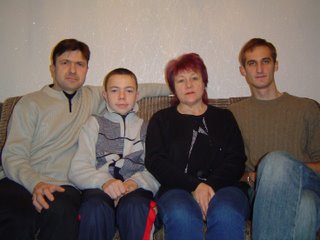
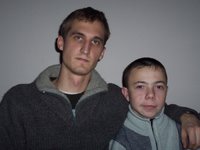
The Dyakovs. This family housed and fed me for about four months when I first got to site (a village called Velyka Lepetykha on the eastern bank of the Dnipro in the Kherson region, directly north of Crimea). I have since moved into my own apartment, but they still look after me somewhat, bringing me produce from their garden, calling to check up on me, etc. They are very nice and hospitable people, among the kindest I have met here or in any country for that matter.
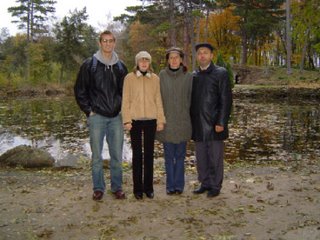
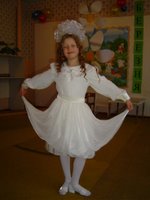
Luda (not to be confused with the rapper Ludacris)- my coordinator, which means she's responsible for getting me situated at school. Unofficially the head of our four-person English department (five including me). Friendly and helpful, does well with our limited resources.
The Myhleys
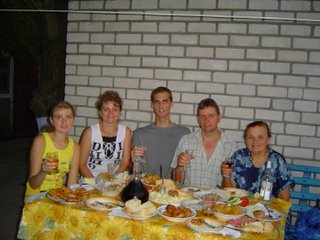
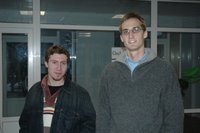
Nathan- friend of mine from training. Actually we've known each other since staging in Chicago, where we were assigned to the same hotel room. He lives in the western part of the country.
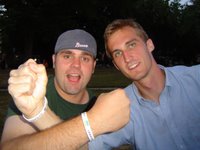
Mike- friend and one of my closest volunteers, geographically. He accompanied me on my tour of Europe this summer.
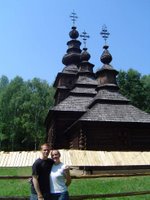
Larry and Karen- friends from training, they live in Lviv. I've visited them once and will definitely be back.
Zombie Jesus-

The Serhienkos. I stayed with this family for the first three months during our training period in a town called Ichnia, Chernihiv region, east of Kyiv. I don't really keep in touch with them anymore, but I am planning a trip to visit them this fall. Notice how visible my receding hairline is in this picture:


- Halya - mother, fine cook, purple hair
- Viktor - father, army officer (he drives tanks!)
- Vadim - son, 14, budding ultimate frisbee star
The Dyakovs. This family housed and fed me for about four months when I first got to site (a village called Velyka Lepetykha on the eastern bank of the Dnipro in the Kherson region, directly north of Crimea). I have since moved into my own apartment, but they still look after me somewhat, bringing me produce from their garden, calling to check up on me, etc. They are very nice and hospitable people, among the kindest I have met here or in any country for that matter.

- Inna- mother, the one who checks up on me most. Tends to the garden and livestock. I talk with her probably more than anyone else in the village, she understands my mistakes and corrects them subtly which has been very good for language learning.
- Seryozha- father, works at (possibly owns) a plant that repairs farm equipment. He works quite a bit and earns a considerable amount. He's somewhat of a community patriarch; last year he bought computers for the school.

- Vova- son, 18, good kid, hard working, smart, entering Shevchenko University in Kyiv this fall for law. Is in to weight lifting, computer games, and driving.
- Masha- daughter, 16, entering 11th and final year at the high school where I teach. Also smart, and has a keen sense of humor. Like most Ukrainian teenage girls she enjoys fashion, pop music, and not eating all that much.
- Alfa and Baron- dogs, smelly
- Tomas a.k.a. "No Mas" a.k.a. "Mas Tequila"- cat, awesome
- A passel of other less noteworthy cats and kittens, some chickens, a goose or two
- Tonya (Shashko)- somehow related to the Dyakovs, nurse at the hospital. Frequent guest at the Dyakovs, who babysit her daughter when she works the night shift. A funny and generally pleasant lady.
- Alina (Shashko)- daughter of Tonya, 8 or 9ish, great conversation partner, even though she laughs at me when I don't know a word. So cute it's almost unbearable:

Luda (not to be confused with the rapper Ludacris)- my coordinator, which means she's responsible for getting me situated at school. Unofficially the head of our four-person English department (five including me). Friendly and helpful, does well with our limited resources.
The Myhleys

- Olya- my music teacher, also likes to give me food and make sure I'm doing ok.
- Posha- Olya's husband, carpenter. A quiet, nice guy.
- Yulia- their daughter, 18ish, studying accounting in Kherson.

Nathan- friend of mine from training. Actually we've known each other since staging in Chicago, where we were assigned to the same hotel room. He lives in the western part of the country.

Mike- friend and one of my closest volunteers, geographically. He accompanied me on my tour of Europe this summer.

Larry and Karen- friends from training, they live in Lviv. I've visited them once and will definitely be back.
Zombie Jesus-

Saturday, August 26, 2006
First post
I'm going to try to put brief updates about my life here, since I'm too lazy to write frequently and I find mass email tacky. I want to post pictures here as well. This first one is me on some sort of mountain in the Carpathians; let's see how it works out:

Well that took quite a while. Maybe I'll just stick to the really good pictures. More later.

Well that took quite a while. Maybe I'll just stick to the really good pictures. More later.
Subscribe to:
Posts (Atom)